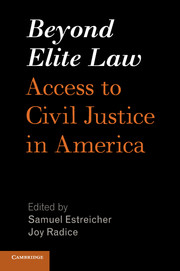Book contents
- Frontmatter
- Contents
- Beyond Elite Law
- Foreword
- List of Contributors
- Overview
- Overview
- PART I CURRENT STATE OF ACCESS TO LEGAL SERVICES
- PART II SOURCES OF LEGAL SERVICES ASSISTANCE FOR WORKING AMERICANS
- PART III FASHIONING A REFORM AGENDA
- PART IV CREATING A CULTURE OF SERVICE
- 43 Integrating Pro Bono with the Law Firm's Business
- 44 Facilitating Law Firm Pro Bono in Transactional Cases
- 45 What Bar Associations Can Do to Improve Access to Civil Justice
- 46 The Teaching Law Office: Service and Learning in the Law School Years
- 47 The Emergency-Room Law School Clinic
- 48 CUNY Law School's Community-Based and Community-Empowering Clinics
- 49 A New Law School in Texas to Address Unmet Legal Needs
- 50 Public Service Residency in Lieu of the Third Year of Law School
- Index
50 - Public Service Residency in Lieu of the Third Year of Law School
from PART IV - CREATING A CULTURE OF SERVICE
Published online by Cambridge University Press: 05 May 2016
- Frontmatter
- Contents
- Beyond Elite Law
- Foreword
- List of Contributors
- Overview
- Overview
- PART I CURRENT STATE OF ACCESS TO LEGAL SERVICES
- PART II SOURCES OF LEGAL SERVICES ASSISTANCE FOR WORKING AMERICANS
- PART III FASHIONING A REFORM AGENDA
- PART IV CREATING A CULTURE OF SERVICE
- 43 Integrating Pro Bono with the Law Firm's Business
- 44 Facilitating Law Firm Pro Bono in Transactional Cases
- 45 What Bar Associations Can Do to Improve Access to Civil Justice
- 46 The Teaching Law Office: Service and Learning in the Law School Years
- 47 The Emergency-Room Law School Clinic
- 48 CUNY Law School's Community-Based and Community-Empowering Clinics
- 49 A New Law School in Texas to Address Unmet Legal Needs
- 50 Public Service Residency in Lieu of the Third Year of Law School
- Index
Summary
The proposal by Samuel Estreicher and Randal Milch, which can be implemented by a change in state supreme court rules, would allow students to become licensed to practice after completing two years of a prescribed law school curriculum and one year of a paid internship working principally on public service matters, broadly defined to include representation of poor and middle-class individuals and families. Law schools will not have to change their degree requirements but many will be under pressure to provide offerings that will be worth the year of tuition and foregone income; they will have to “earn” the third year, rather than have it imposed by law.
President Obama's remarks on the utility of the third year of law school have rekindled public debate over the value of requiring students to finish three years of law school before they can take the bar examination and practice law. We are proposing a Public Service Residency Program as a practical alternative to the third year of law school. We believe that this Program, which can be flexibly implemented in accordance with local legal and political requirements, will produce new lawyers with greater experience and less debt, and thus with more to offer to prospective employers and greater freedom to take legal jobs of their choice and further the needs of the community.
The Public Service Residency Program would be an option that students might select. It would not require law schools or the ABA to change their current requirements for a JD degree.
The parameters of the proposal (which would require action by the State Supreme Court) are set out later, but the nuts and bolts are simple. After completing a core curriculum in the first two years of law school, participating students would, beginning in the summer after the second year, undertake a year's Public Service Residency with a participating law firm, corporate legal office, government agency, or nongovernmental organization. These sponsoring organizations would be responsible for providing the Residents with three things: supervised legal work on behalf of one or more clients involved in public service matters, compensation, and certification at the year's end of the Resident's satisfactory performance. There is no requirement that the sponsoring organization offer the Resident a permanent position at the end of the Residency.
Information
- Type
- Chapter
- Information
- Beyond Elite LawAccess to Civil Justice in America, pp. 701 - 704Publisher: Cambridge University PressPrint publication year: 2016
